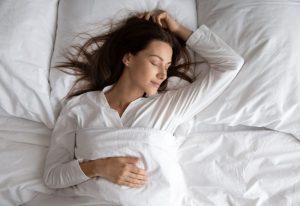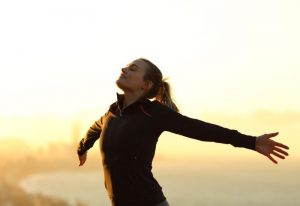COVID-19 has ushered in a challenging era rife with the accompanying lifestyle changes and virus-related restrictions. For many people, according to the results of a recent study, COVID-19 restrictions have led to less time spent outside, more time spent in sedentary screen activities and, interestingly, reduced sleep quality.
Recently, researchers were able to show that spending more time outdoors and getting good sleep boosts well-being, demonstrating a clear link between time spent outside, sleep quality and overall well-being. Their research confirms prior studies with similar findings, while highlighting the importance of spending time outdoors during the COVID-19 era.
How Good Sleep Boosts Well-Being
 Sleep quality has been associated with health and well-being for thousands of years. Modern medicine has brought us plenty of clinical evidence to support that age-old concept. Good sleep, meaning a sufficient amount time and of a quality that allows a person to move through the sleep stages, is essential to optimal immune function and metabolic activities. Cognitive function, intellectual performance and mental health are also associated with good sleep.
Sleep quality has been associated with health and well-being for thousands of years. Modern medicine has brought us plenty of clinical evidence to support that age-old concept. Good sleep, meaning a sufficient amount time and of a quality that allows a person to move through the sleep stages, is essential to optimal immune function and metabolic activities. Cognitive function, intellectual performance and mental health are also associated with good sleep.
Poor sleep quality and insufficient sleep are both associated with a wide range of physical and mental health problems. Chronic sleep deprivation is linked to increased risk of obesity, cardiovascular disease, type two diabetes, metabolic disorders and certain types of cancer, particularly those with a hormone disruption connection, such as breast cancer. Depression, anxiety and other mood disorder risks are also higher with sleep deprivation and routinely poor sleep quality.
The Outdoor Connection
A team of researchers worked together on a recent study published in the Journal of Sleep Research. The team included researchers from Ariel University, Israel, the Russian Academy of Science, LMU Munich, Germany, and the National Institute of Mental Health, Tokyo, Japan. This study used data collected from 7,517 adults from numerous countries via a Global Chrono Corona Survey provided to the participants over the Internet. The results of this study revealed significant connections between time spent outdoors, sleep quality and overall well-being.
From the data, researchers saw that many people living under COVID-19 restrictions and other lifestyle changes related to the virus were spending less time outside and more time engaged in sedentary activities. The increase of screen time was notable, according to the study results. According to the researchers, spending less time outside was linked to delayed sleep times, deteriorating quality of life and reducing well-being.
In light of what we already know about the connections between natural light, physical activity, the circadian rhythm and sleep quality, the results of that study are perfectly logical. The roughly 24-hour circadian rhythm that helps regulate many of the day-to-day processes within the body and mind is tightly connected to the sleep-wake cycle. Light is the most powerful of the environmental cues that impact the health and function of the circadian rhythm and, thus, sleep timing and quality.
Outdoor light, the natural light of the sun, differs dramatically in brightness and quality from indoor lighting. And, it is natural light that our bodies evolved to over thousands upon thousands of years and countless generations. That natural light has a reliable rhythm, one that influenced the very mechanics of how out bodies work, including the metabolic system and circadian rhythm. With reduced exposure to natural light and increased artificial light exposure, often well into the evening and night, it’s no wonder that so many people experienced sleep disruption due to COVID-19 restrictions and lifestyle changes.
Another aspect of that reduction in time spent outside is a decrease in physical activity. Physical activity and sleep quality are also linked. Getting enough physical activity is an important part of enjoying better sleep quality. However, it is important to remember that for the best sleep quality and circadian rhythm health, the timing of physical activity matters. For the best results, combine physical activity with outdoor morning light exposure. Exercising in the evening, because of its impact on the metabolic system and other physiological effects, can interfere with sleep quality. That is because evolutionarily we are designed to be active during the day and to rest at night.
Especially Important During the COVID-19 Era

There is also plenty of evidence that spending time outside and engaging in daily physical activity plays a positive role in sleep quality, helps to improve immune function, can reduce disease risk and contributes to overall health and well-being. Better health has been associated with better COVID-19 outcomes, adding to the importance of being proactive with sleep quality and health.







